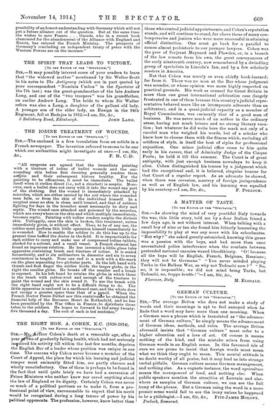THE RIGHT HON. A. COHEN, B.C. (1830-1914).
[TO THE EDITOR OY THE " SPECTATOR.”1
-Ashur Cohen's death at a venerable age, after a
year wo of gradually failing health, which had not seriously imvaired his activity till within the last few months, deprives the English Bar of a leader whose position was unique in our time. The reasons why Cobol never became a member of the Court of Appeal, the place for which his learning and judicial temper most eminently fitted him, are partly obscure and wholly unsatisfactory. One of them is perhaps to be found in the fact that until quite lately we have bad a succession of Prime Ministers who neither knew nor cared anything about the law of England or its dignity. Certainly Cohen was never so much of a political partisan as to make it, from a pro- fessional point of view, unreasonable to eared that his merit would be recognized during a long tenure of power by his political opponents. The profession, however, knew better than those who control judicial appointments, and Cohen's reputation stands, and will continue to stand, far above those of many con- temporaries and juniors who were more successful in attaining official distinction. One must go back for a parallel to names almost prehistoric to our younger lawyers. Cohen was the peer of Serjeant Maynard and Plowden, or, in a branch of the law remote from his own, the great conveyancers of the early nineteenth century, now remembered by a dwindling group of specialists in Lincoln's Inn, and by a few scholarly masters in America.
Not that Cohen was merely or even chiefly book-learned; far from it. There was no man at the Bar whose judgment was sounder, or whose opinion was more highly respected on practical grounds. His work as counsel for Great Britain in more than one great international arbitration case (largely frustrated in one of them because this country's judicial repre- sentative behaved more like an intemperate advocate than an arbitrator), and in a quasi-judicial capacity as a member of Royal Commissions, was eminently that of a good man of business. He was never much of an author in the ordinary sense, having not much leisure and no strong literary voca- tion ; but whatever he did write bore the mark not only of a careful man who weighed his words, but of a scholar who knew how to choose them with the fitness which, excluding all artifices of style, is itself the best of styles for professional exposition. One minor judicial office came to him quite early in his career, that of Admiralty Judge of the Cinque Ports ; he held it till this summer. The Court is of great antiquity, with just enough business nowadays to keep it alive. Cohen distinguished his tenure by a judgment which had the exceptional and, it is believed, singular honour for that Court of a regular report. As an advocate he showed, when there was occasion, mastery of foreign jurisprudence as well as of English law, and his learning was equalled






































 Previous page
Previous page